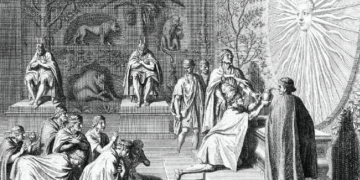Malthusian Theory of Population
1) About Malthus:
Thomas Robert Malthus was an influential 18th and 19th-century economist and demographer who is best known for his theory of population. Born on February 13, 1766, in Surrey, England, Malthus belonged to a prosperous family and received a quality education at Jesus College, Cambridge. He studied a wide range of subjects, including mathematics, economics, and theology, which laid the foundation for his later work.
Malthus’ most renowned work, “An Essay on the Principle of Population,” published in 1798, outlined his theory that population growth tends to outstrip the available resources, leading to inevitable struggles and hardships for the human population. This theory, now referred to as the Malthusian Theory of Population, challenged optimistic views of human progress and argued for the need to control population growth to avoid detrimental consequences.
Malthus contended that while population has the potential to grow exponentially, the resources available to sustain human life, such as food, land, and other necessities, can only increase arithmetically. He argued that this discrepancy between population growth and resource availability would inevitably result in overpopulation, poverty, and misery unless preventive checks (reducing birth rates) and positive checks (increasing death rates) were implemented.
Contrary to the prevailing optimism of his time, Malthus’ theory painted a pessimistic picture of the future, suggesting that population growth would eventually be curbed through natural means such as famine, disease, and war. He believed that these “checks” would act as natural population controls and prevent excessive growth, thereby restoring a balance between population and resources.
Malthus’ theory was highly controversial and sparked intense debates. Critics argued that technological advancements, improvements in agriculture, and human ingenuity could mitigate the challenges of overpopulation. Nevertheless, Malthus’ work had a lasting impact and influenced subsequent thinkers in various fields, including economics, sociology, and environmental studies. It is important to note that Malthus’ theory has been both criticized and revised over time.
Critics argue that it overlooks factors such as technological advancements, changes in agricultural practices, and the potential for economic development to address resource scarcity. Nonetheless, the Malthusian Theory of Population remains a significant contribution to understanding the complex dynamics between population growth, resource availability, and societal well-being.
Thomas Robert Malthus was an influential economist and demographer whose theory of population continues to shape discussions on the relationship between population growth and resources. His work highlighted the potential for population to outstrip available resources, leading to hardships and necessitating the implementation of preventive and positive checks on population growth. Although subject to criticism and revision, Malthus’ theory remains a significant contribution to understanding the challenges associated with population dynamics and resource constraints.
2) Malthusian theory of population:
The Malthusian Theory of Population, proposed by Thomas Robert Malthus, posits that population growth tends to outpace the availability of resources, leading to negative consequences for society. Malthus developed this theory in his influential work, “An Essay on the Principle of Population,” published in 1798. In this section, we will explore the key concepts and arguments put forth by Malthus in his theory.
Malthus argued that population has the potential to grow at a geometric rate, doubling in size over a relatively short period. On the other hand, he posited that the production of food and other resources increases at a slower arithmetic rate. This disparity, according to Malthus, creates a situation where population growth surpasses the capacity of resources to sustain it.
The consequence of this imbalance, as outlined by Malthus, is the occurrence of “positive checks” and “preventive checks” on population growth. Positive checks include factors such as famine, disease, and war, which naturally reduce population numbers through increased mortality rates. Preventive checks, on the other hand, encompass voluntary measures taken by individuals to control their family size, such as delaying marriage, practicing contraception, or abstaining from sexual relations.
According to Malthus, these checks are necessary to prevent the population from exceeding the limits of available resources. He argued that if left unchecked, population growth would lead to overpopulation, which, in turn, would result in widespread poverty, malnutrition, and suffering. The positive checks, although harsh in their effects, were viewed by Malthus as natural mechanisms that would keep the population in check and restore balance between population and resources.
Malthus’ theory also had profound implications for social and economic policies. He contended that efforts to improve the conditions of the poor, such as providing welfare or assistance, would only exacerbate the problem by encouraging population growth without a corresponding increase in resources. Malthus believed that the only effective solution was to implement preventive measures, primarily through moral restraint and the promotion of prudence in family planning.
Critics of Malthusian theory argue that it overlooks important factors such as technological advancements, agricultural innovations, and economic development, which can expand the availability of resources and alleviate the pressures of population growth. They contend that Malthus’ predictions of widespread suffering and population crises have not materialized to the extent he predicted.
Nevertheless, the Malthusian Theory of Population has had a lasting impact on the fields of demography, economics, and sociology. It stimulated further research and debates on population dynamics, resource scarcity, and the role of population control measures. While Malthus’ theory may not provide a comprehensive explanation of population growth and resource constraints, it serves as a significant contribution to our understanding of the complex interactions between population, resources, and societal well-being.
3) Its Implications on Economics:
The Malthusian Theory of Population has significant implications for the field of economics. By highlighting the potential imbalance between population growth and resource availability, Malthus raised important concerns about the long-term sustainability of economic systems. In this section, we will explore the implications of Malthus’ theory on economics and its influence on economic thought.
The Malthusian Theory draws attention to the finite nature of resources and the potential for scarcity. Malthus argued that population growth could exhaust the available resources, leading to increased competition and declining standards of living. This perspective underscores the importance of resource management, sustainable development, and the efficient allocation of resources in economic systems.
The Malthusian Theory provides insights into the relationship between population growth and productivity. Malthus suggested that population growth could put pressure on resources, potentially leading to diminishing returns in agricultural production. This perspective emphasizes the role of technological progress and innovation in improving productivity and overcoming resource limitations. It encourages economic analysis to explore how technological advancements can alleviate the constraints imposed by population growth.
Malthus’ theory has implications for the dynamics of labor supply and wages. According to his theory, population growth can lead to an oversupply of labor relative to available employment opportunities. This surplus labor could drive down wages and result in lower living standards. Malthus’ work prompted economists to examine the relationship between population growth, labor market dynamics, and wage determination, contributing to the development of labor economics.
The Malthusian Theory sparked discussions about population control policies. Malthus argued for the necessity of preventive checks on population growth to avoid the negative consequences of overpopulation. This perspective has influenced debates on family planning, contraception, and population policies. Economists have examined the impact of population control measures on economic development, demographic transitions, and the well-being of societies.
The Malthusian perspective raises questions about the relationship between population growth and economic growth. While Malthus highlighted the potential constraints imposed by population growth, subsequent economists have explored the role of economic development in breaking the Malthusian trap. They have studied the interplay between factors such as technological progress, capital accumulation, and institutional frameworks in promoting economic growth and improving living standards despite population growth.
It is essential to note that the Malthusian Theory has faced criticism and has been subject to revision and refinement over time. Critics argue that technological advancements, changes in production methods, and human ingenuity can mitigate the challenges of resource scarcity and population growth. Nonetheless, the theory’s influence on economic thought persists, as it prompts economists to consider the implications of population dynamics and resource limitations in their analyses.
The Malthusian Theory of Population has several implications for economics. It highlights the potential for resource scarcity, emphasizes the role of productivity and technological progress, examines labor market dynamics and wages, influences population policies, and raises questions about economic growth and development.
While subject to criticism, the theory has contributed to economic discussions on the challenges associated with population growth and resource constraints, shaping our understanding of the complex interactions between population dynamics and economic systems.
4) Its Criticisms:
The Malthusian Theory of Population proposed by Thomas Robert Malthus has faced several criticisms and has been subject to extensive debate and revision over time. Critics argue that the theory oversimplifies complex socio-economic dynamics and overlooks important factors that can mitigate the challenges associated with population growth. Here are some key criticisms of the Malthusian Theory:
One of the primary criticisms of the Malthusian Theory is its failure to adequately account for technological progress. Critics argue that advancements in technology, particularly in agriculture, have significantly increased food production and resource availability. Innovations such as genetically modified crops, efficient irrigation systems, and improved farming techniques have enabled increased yields and helped feed growing populations.
Market Mechanisms and Price Signals: Critics contend that the Malthusian Theory does not sufficiently consider the role of market mechanisms and price signals in addressing resource scarcity. In free-market economies, price mechanisms encourage resource conservation, stimulate innovation, and promote efficient allocation. As resources become scarcer, pricesrise, providing incentives for producers to find alternative resources or develop substitutes, ensuring a more sustainable use of resources.
Another criticism of the Malthusian Theory is its failure to recognize the transformative effects of economic development and international trade. Economic growth and globalization have led to increased specialization, access to diverse resources, and improved living standards. Countries can import resources they lack domestically, reducing the strain on their own resource base and enabling population growth without experiencing dire consequences.
Critics argue that the Malthusian Theory does not adequately account for demographic transitions. As societies undergo economic and social changes, birth rates tend to decline, often due to factors such as increased education, improved healthcare, and access to family planning. These shifts in demographic patterns can mitigate the pressures of population growth and contribute to sustainable population levels.
Critics contend that the Malthusian Theory does not sufficiently address the importance of environmental sustainability. While resource availability might increase temporarily through technological advancements or trade, the long-term viability of the planet’s ecosystems needs to be considered. The theory should account for the environmental consequences of resource exploitation and advocate for sustainable practices to avoid ecological degradation.
Critics argue that the Malthusian Theory neglects ethical and social considerations. Malthus’ emphasis on preventive checks and moral restraint to control population growth has been criticized for ignoring individual rights and reproductive autonomy. It is essential to balance population dynamics with principles of human rights, social justice, and equitable access to resources.
5) Malthus Today:
Although Thomas Robert Malthus developed his theory of population more than two centuries ago, his ideas continue to provoke discussions and find applications in various contexts in the modern world. While some of Malthus’ predictions have not materialized to the extent he envisaged, his theory still offers valuable insights into population dynamics, resource constraints, and their implications. Here, we will explore the relevance and application of Malthusian principles in today’s society.
Malthus’ concerns about population growth and its potential impact on resource availability remain relevant today. The global population continues to grow, albeit at a slower rate compared to Malthus’ time. The theory prompts us to consider the implications of sustained population growth on food security, water resources, energy demands, and environmental sustainability.
Malthusian principles draw attention to the limited availability of natural resources and the environmental challenges associated with population growth. As the world faces issues such as climate change, deforestation, water scarcity, and biodiversity loss, Malthus’ theory reminds us of the need to adopt sustainable practices, preserve ecosystems, and manage resources efficiently.
Malthus’ insights into the relationship between population growth and food production resonate in discussions on global food security. As the population increases, the demand for food rises. Malthusian principles emphasize the importance of agricultural innovation, sustainable farming practices, and equitable distribution of food to meet the nutritional needs of a growing population.
The rapid urbanization observed globally aligns with Malthus’ predictions of population concentration in urban areas. His theory prompts us to consider the challenges associated with urbanization, such as housing, infrastructure, and access to basic services. Malthusian principles can inform urban planning strategies that ensure sustainable development and improve the quality of life for urban populations.
Malthus’ theory sheds light on the potential exacerbation of social and economic inequalities resulting from population growth and resource limitations. The theory prompts discussions on income disparities, access to education, healthcare, and opportunities for marginalized communities. Understanding the implications of population dynamics can guide policies and initiatives aimed at reducing inequalities and promoting social justice.
Malthusian principles find resonance with the United Nations’ Sustainable Development Goals (SDGs). The SDGs address a range of global challenges, including poverty, hunger, health, education, and environmental sustainability. Malthus’ theory provides a framework for considering the interconnections between population growth, resource availability, and the achievement of these goals.
It is important to note that Malthusian principles should be considered in conjunction with other theories, empirical evidence, and contemporary knowledge. The theory does not provide a comprehensive framework to address all aspects of population dynamics and resource management. Nevertheless, Malthus’ ideas continue to stimulate critical thinking, inform policy debates, and encourage proactive approaches to address the challenges associated with population growth, resource constraints, and sustainable development in the modern world.












